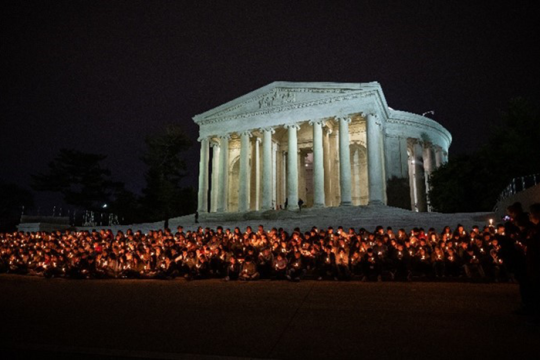As Congress and the administration consider different approaches to allocating the funding to run our government, we are here to discuss the budget negotiations on our country’s most vulnerable populations. We believe that the federal budget is a moral document. We want to support vital domestic programs that respond to the needs of people in need. In Deuteronomy, one of the five books of Moses, we are taught “If... there is a needy person among you... do not harden your heart and shut your hand against your kin. Rather, you must open your hand and lend whatever is sufficient. “Let us pray that our budget will keep maintain these ideals. As people of faith, we advocate for a just and compassionate federal budget that will promote the dignity of all Americans and will protect the vulnerable. Yet let us also be called to act: given this knowledge given to us during this webinar and our passions, let us “speak up, judge righteously, champion the poor and the needy.” Let us advocate for a budget that will do just that. We pray for a budget that well help all Americans and ensure a bright future for the country.http://youtube.com/watch?v=_l0lBuPu8aU Last week, I opened a webinar the RAC hosted titled Decoding the Budget: Enormous Consequences for Poverty and How You Can Make an Impact. As people of faith, our Jewish values encourage us to advocate for systems that can lift people out of poverty. Jewish history also provides us with an example for helping the needy. During Talmudic times, much of tzedakah (justice) was done though tax-financed, community-run programs that helped those in needed, paralleling the social safety net that we continue to fight for today. Our budget is a moral document that can create the platform for addressing these and other injustices. Our federal budget has a significant impact on the 45.3 million people, including millions of children, living in poverty in this country. During the webinar, we heard from Amelia Kegan from Bread for the World, Raed Jarrar from American Friends Service Committee, Kathy Saile from Center on Budget and Policy Priorities and Tila Neguse from the Friends Committee on National Legislation about the budget appropriations process, sequestration and its impact on funding for domestic poverty programs, some of the proposals we have seen so far in 2015, and action steps to get involved. As Congress continues debating the budget, we must advocate for the federal safety net, which aims to help reduce economic inequality. Watch the recording of the webinar here!
Related Posts
Image

Teens from North Carolina Speak About Environmental Justice
This year, as we approach Earth Day on April 22nd, we are amplifying the voices of our L'Taken participants. These teens, who are at the forefront of our fight for environmental justice and climate change, are not just the future-they are the present.
Image

Why is this Right Different?: City of Grants Pass, Oregon v. Johnson and the Passover Call to Action
As families prepare for the Passover seder and its celebration of freedom, the Supreme Court will hear a case in which the basic civil rights of unhoused people are at stake.
Image

Highlights from the 2023-2024 L'Taken Season
Another incredible L'Taken season has come to a conclusion! Over the 2023-2024 season, we had over 1,300 Jewish high schoolers from across North America join us in Washington, D.C. over our four weekends.
